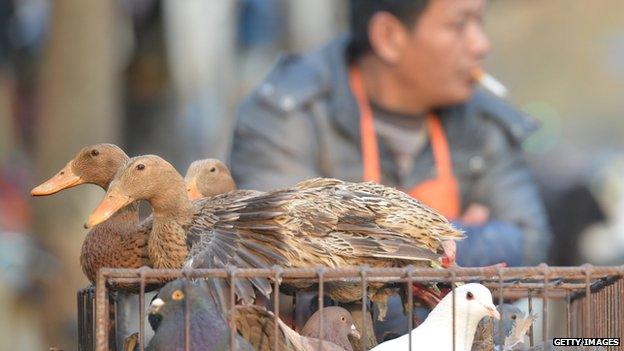H7N9: Bird flu cases surge ahead of Chinese New Year
- Published

A surge in cases of the deadly new strain of bird flu has been reported in China at the beginning of 2014.
Only a handful of people had been infected with H7N9 since June, but health officials have reported 73 cases so far this month, external.
Influenza researchers argue the winter season and preparations for Chinese New Year may be driving the increase.
The World Health Organization called for vigilance, saying the virus was likely to remain present for some time.
H7N9 made the jump from infecting domestic chickens and ducks to infecting people at the end of March 2013.
Within a month, 126 cases and 24 deaths had been recorded.
The virus was stopped in its tracks as control measures, such as closing live poultry markets, were introduced.
There were just five cases between June and November.
The recent jump takes the total number of cases to 219, including 55 deaths.
Apart from a couple of cases in close family clusters, the virus has not been able to spread from person to person.
Gregory Hartl, spokesman for the World Health Organization (WHO), said flu viruses circulated more easily during the colder winter months.
"Our calculation was always that we were going to have to watch the winter, and that's where we are at the moment.
"We need to remain vigilant, but so far the virus does not seem to have mutated in any way," he says.
"Some people will be looking very closely at the Chinese New Year, when there will be lots of people travelling.
"It will be crowded on trains and they'll also be travelling with chickens."

There are fears that Chinese New Year, on 31 January, may affect cases
Prof John McCauley, the director of a WHO collaborating centre on influenza in London, said: "I've been worried all the time about H7N9; it's highly virulent and the case fatality is about one in three, so it poses a threat."
The range of the virus had also spread, he added, with cases in Guangdong province, further south and east than previously.
He said the winter might not be the whole explanation, particularly in southern provinces closer to the equator.
"It may be seasonal, or an alternative is more poultry exposure in the build-up to Chinese New Year, and more poultry going through the markets.
"They might need to reconsider closure of the markets."
'Good position'
The H7N9 virus itself, however, does not appear to have mutated in a way that could make it more likely to spread around the globe.
Prof Wendy Barclay, an influenza researcher at Imperial College London, did not think the virus had changed.
"There's still no evidence of human-to-human transmission or mutations to make it closer to a pandemic.
"So from that perspective there's nothing new to worry about."
She said overall "we're in as good a position as we could hope" and the early steps of producing a vaccine were now completed.
"We're back to waiting to see if it does mutate."
The WHO does not advise any travel or trade restrictions because of bird flu, while the European Centres of Disease Control rates the virus as a "significant long-term threat, external".
- Published1 May 2013
- Published7 August 2013
- Published23 January 2014
- Published28 May 2013
- Published10 September 2013